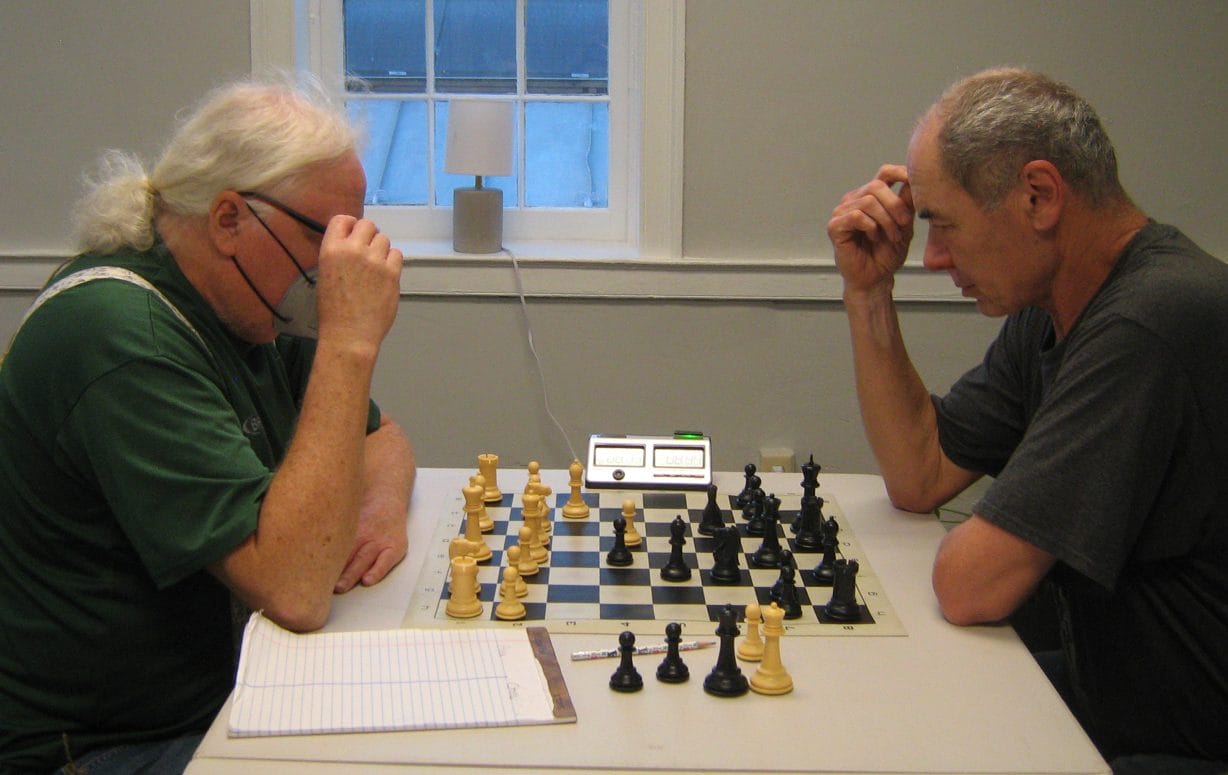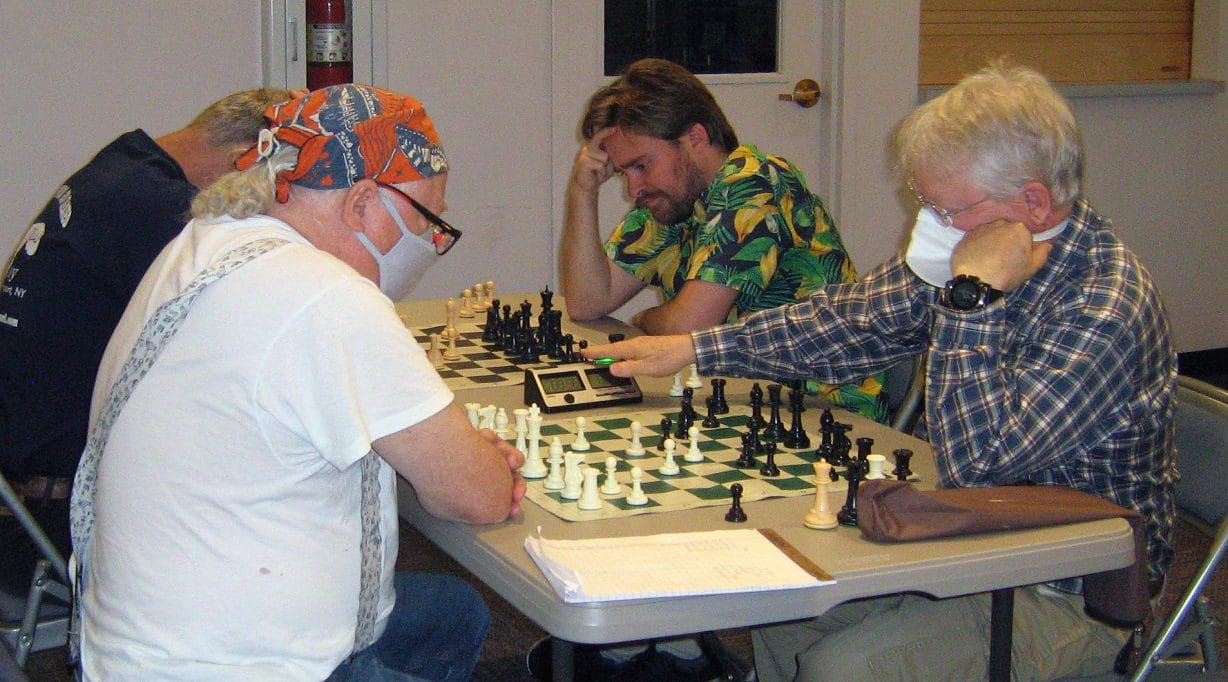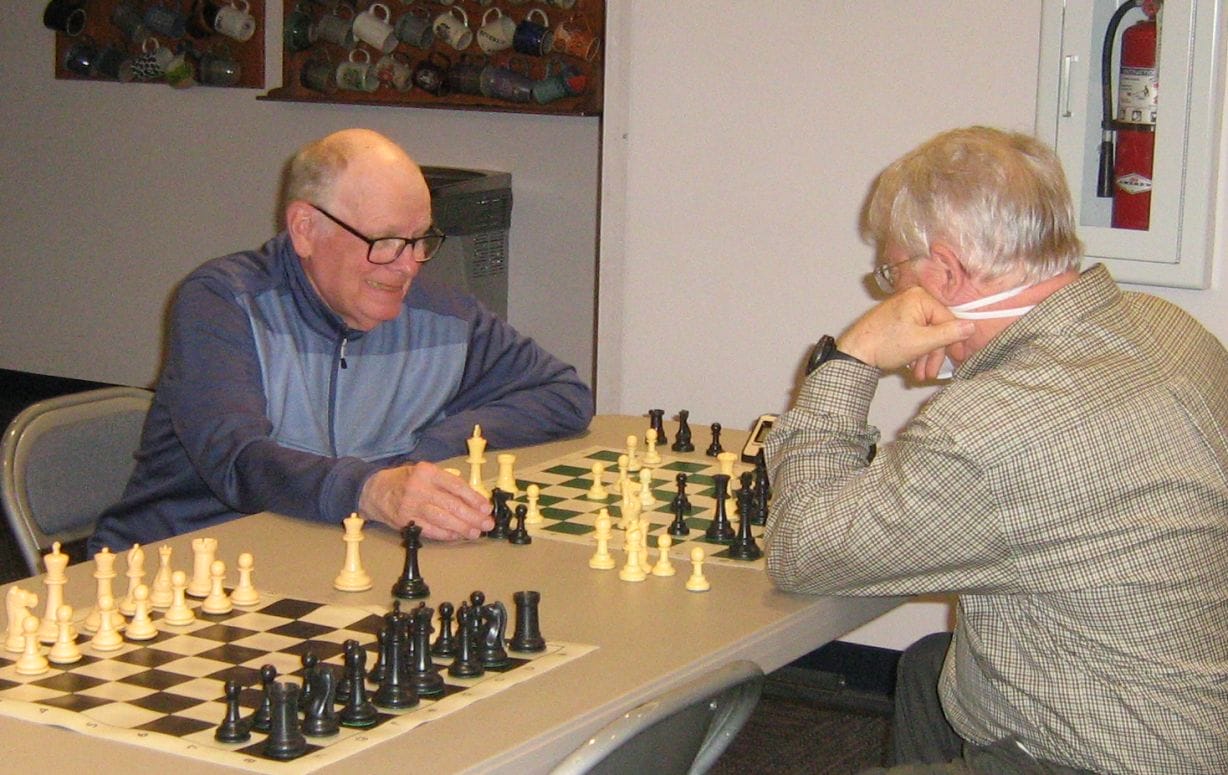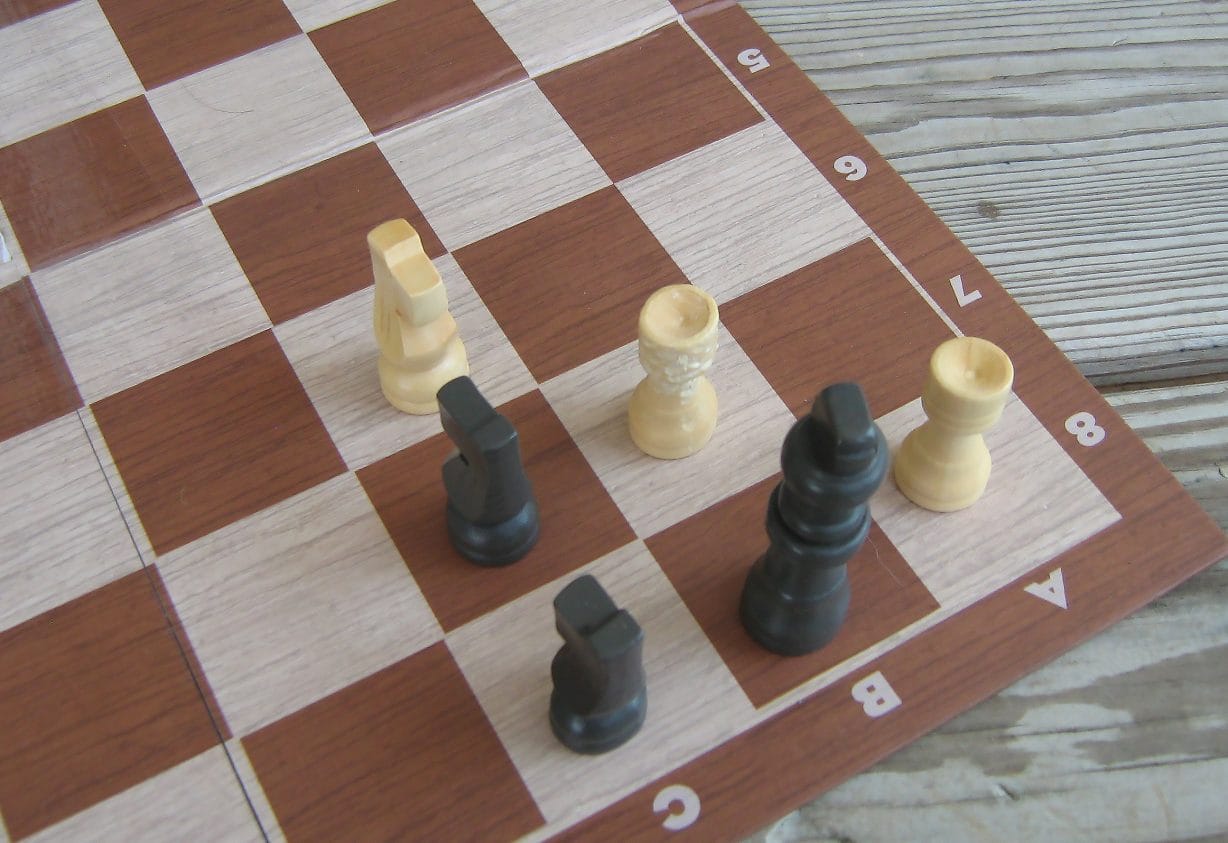
By Stephanie Spernak, contributor
In an age of seemingly online everything, Harrisonburg’s local chess club continues to attract new members — and strong competition — in part because many of the players prefer playing their opponent across the table rather than across cyberspace.
And at the Harrisonburg Chess Club, which has been a fixture in the city since about 1985, that competition is friendly and recreational with casual instruction mixed in, but also can be intense with some well-established experts among its regulars.
“If you love to play chess, you will want to join our club,” said William Leigh, 63, a Harrisonburg native who lives in Bridgewater. “It helps to sharpen your chess skills to play against other players.”
But the most important thing that he says beginners should know about club chess is that “it’s fun!”
The club has had different venues over the years, including the Massanutten Regional Library on Main Street, but it now meets 7:30 p.m. Thursdays at the Trinity Presbyterian Church on South High Street.
All levels and ages of players are welcome, said Figliola, “even those who have never touched a chess piece before.”
The club furnishes chess boards, chess pieces, and clocks for those who wish to play timed chess.
Chess clubs have a designated “game master” to manage the club’s operation, and the Harrisonburg’ club’s game master for the last seven years has been Christopher Figliola, a retired New York law enforcement officer, originally from Queens, New York.
During the time he’s been game master, he said that the club has had about 16-18 members, with 6-8 members showing up regularly for the Thursday matches.
Figliola, 66, drives one of the city’s Blue Line buses two days a week and now lives a few miles east of Harrisonburg in Penn Laird, which he said is “like living in a postcard” because of the Shenandoah Valley’s stunning scenery.
Figliola said he learned to play chess when he was nine years old after being taught by a friend in his neighborhood. He said he joined the Harrisonburg Chess Club because he “enjoys playing live chess across the board from a real person that you can get to know.”
A player can also engage in a post-game analysis with their opponent on the spot, an essential task for anyone who hopes to improve their game.
Chess also helps “keep your brain sharp,” he added.
In addition to club play, he also competes in online chess against other humans, Figliola said, “but online chess takes some getting used to” because you are looking directly at the chess board positioned vertically on the screen, instead of down on the board as in-person players are used to. He said he has played about 25 games at online chess sites with people from all over the world, including China and the Netherlands.
Regular practice playing chess and reading chess books, is the way to improve your game, he said. A “good chess player” he said, is “someone who has the desire to play, does not make obvious blunders, and knows how to recognize a trap and also set a trap.”
Developing this skill set, he said, takes much more study than just “learning how the pieces move” and lots of practice beyond “beating the relatives in chess games after Thanksgiving dinner.”
Figliola said “good players know there way around the board, and they know when and what not to move.”

A chance to learn from experts
The Harrisonburg Chess Club boasts several members who have achieved high ratings as tournament players.
William Leigh, one of the Harrisonburg Chess Club’s founding members for instance, said he had an official chess rating of 1660 when he was playing in tournaments from 1993 to 1995. That rating placed him in a range representing an “above average tournament player.” Anything below 1000 is considered novice, while grandmasters are usually rated at 2500 and above. Magnus Carlson, a Norwegian chess grandmaster and former five-time World Chess Champion (2013–2023) has the highest chess rating in history, at 2882.
A speech therapist, he works in Winchester and graduated from James Madison University’s speech-language pathology program in 1989, Leigh says he plays [ARTa1] [SS2] chess online weekly but doesn’t care to play against the computer. He chooses to play another against other humans, many in other countries. He said he believes modern chess computers are now invincible in games against humans.
He says he can easily visualize the board and pieces in his mind’s eye, which is a valuable skill in chess. Leigh said the ability to visualize the board as it will look “4-8 moves ahead” and a “strong memory for positions and previous games separate the strong chess player from the casual or weak player. He said he often dreams of playing chess. Leigh says that his major chess blunder is losing pieces without gaining an advantage against his opponent.
The chess rating process adopted by the United States Chess Federation, involves complicated statistical methods for calculating a number that “helps determine a person’s estimated strength for tournament level play.” Chess clubs that become formal affiliates of the United States Chess Federation are the only clubs authorized to put on sanctioned tournaments and provide players with official ratings.
Dave Hulvey, a Harrisonburg native has been playing at the Harrisonburg Chess Club for the past six years. Hulvey is a self-taught player who achieved an “expert” rating of above 2000 when he was playing national and international tournaments in the ‘80s and ‘90s, many of which landed him in newspaper coverage in the early 1990s. He said he has also beat a Russian grand master and an international grand master.
Hulvey is a retired librarian from the Department of the Treasury in Washington, D.C., where he often played chess in Lafayette Park, across from the White House.
At any given meeting, those veteran experts mix it up with some of the newer players.
Noah Pope, a 22-year-old JMU student majoring in mathematics and economics, recently joined the club. Pope, who is self-taught, started out at the Club with a lot to learn but almost “overnight” became a strong player, Figliola said. Pope attributed this phenomenon to playing several online chess games daily for many weeks.
Liam Riedel, 10, is the club’s newest and youngest player. He lives outside Harrisonburg with his father Seth and mother, Jennifer. He is in the fifth grade at John Wayland Elementary School.
He said a cousin taught him to play chess and he, in turn, taught his dad to play. Liam said he now regularly beats his dad at chess. He credits his mother with finding the Harrisonburg Chess Club via its Facebook page so he could play with others. Liam said the thing he likes best about chess is: “winning!”

Regular players who track strategies
Alex McLeod is another founding member of the Harrisonburg Chess Club. He said he moved to the area several years ago to obtain a teaching certificate from James Madison University. He now lives in Broadway.
After graduating from Clemson University, McLeod said he lived for a time on a 50-acre, six-member, self-sustaining North Mountain commune, now disbanded, located near Lexington. He learned to play chess from one of the commune residents.
He described a good player as “one who makes the best use of his position on the board,” and, contrary to Leigh, he believes that the best human players are “as good as a computer.”
In 1996, McLeod said he had a 1600 USCF rating and once tied an opponent with an “amateur expert” rating.
McLeod said he uses a chess software program with a database where he can record and analyze all his game moves.
Albert Kellogg, 72, is a long-time member of the Harrisonburg Chess Club. He is a retired computer programmer and lives in Bridgewater. He has been playing regularly at the Harrisonburg Chess Club for the past 10 years.
Kellogg taught himself to play chess in high school in his hometown of Morristown, New Jersey. Later, after he joined the U.S. Army, he was stationed at Fort Dix in New Jersey, where he played in tournaments held on the base. He had an official USCF rating, but no longer remembers that number.
He said he occasionally plays online chess with a computer opponent. He said he likes to play online because the computerized games allow him to replay a move several times and see the different outcomes. He recommends online play because it’s a “great way to practice different openings.”
Chess openings are considered the first three moves made by each player and have been the subject of intense study for hundreds of years because of their effect on the rest of the game. The player who draws lots for the first move must play the white pieces against his opponent with the black pieces, a legacy of the Code of Chess Laws issued in 1880 by the Fifth American Chess Congress. The so-called white opening rule gives a slight advantage to this player and has been controversial from the start. A study of over a million chess games showed that the player with the white opening move wins 55% of games.
Dave Sebastian, a former Marine, who now works part-time for a defense contractor, moved to Harrisonburg in 2019 and has been playing at the club since then. He said he has been playing chess for about 50 years. He said he learned to play from his master sergeant while stationed in Hawaii. He has played in tournaments and has been rated at 1300.

The Game
Chess is a game of war. It symbolizes the taking of territory, attacking enemy troops, and capturing their king. Deep and strategic thinking is necessary. There is no element of chance in the game. It’s all skill, a feature that makes chess so satisfying that it has attracted passionate players for millennia.
The besotted player also describes the logic underlying chess, like math, as producing patterns on the board that have an intrinsic beauty, such as the checkmated King in the image.
Chess is hard. Garry Kasparov, considered by some to be the “GOAT” of chess players, reportedly said during a match that “chess is mental torture.”
The skill necessary to “think ahead” and analyze potential moves in a game, both one’s own and the opponent’s potential moves, requires considerable practice and skill.
Here is an example of the “thinking ahead” or visualization skill that is so important for success in chess. A player will observe that a piece, say a knight, is on a square that is open to capture by the opponent’s piece. This is “looking” one move ahead. And then will require a decision whether to move the piece away from the threat or allow the opponent to take the piece, hopefully in exchange for some advantage.
But many common mistakes in chess happen because players simply don’t “see” these possibilities when they are right in front of them. Chess is considered transparent in the sense that no information is hidden, as in card games.
However, the most valuable information in the game is unknown and that is what moves your opponent is likely to make. Some players execute the same strategic patterns in their games and become predictable in that way.
Successfully thinking ahead in chess is limited by the sheer number of moves possible by two players on a 64 square board with 8 pieces each, that move in certain ways dictated by the rules.
The number of possible positions in chess is estimated to be about 10120, which is 10 followed by 120 zeros, an incomprehensible number called the Shannon Number, after Claude Shannon, who developed the estimate as a part of an influential paper that he wrote in 1950 called “Programming a Computer for Playing Chess.”
To put this number in perspective, Chess Journal notes that the Shannon estimate of possible chess moves in a game is greater than the number of atoms that scientists propose exist in the observable universe, which is estimated at 1080.
Because of this vast number of possible moves, chess is not considered a “solved” game, and may never be, according to the online site, Chess Journal, that writes: “A game is considered solved if there exists a perfect strategy that guarantees a win, loss, or draw for one of the players, regardless of the moves made by the other player. This strategy can be obtained by analyzing all possible moves and their outcomes using mathematical algorithms.”
Chess Journal explains that tic-tac-toe, for example, unlike chess, is a “solved” game. Tic-tac-toe can be “solved” because it has a limited number of possible moves, and every possible outcome of those moves can be calculated using a decision tree,” a task at which computers are especially adept. Chess, on the other hand, “has an enormous number of possible positions and moves, making it impossible to analyze every possible outcome using current technology.”
Many believe however, and Nathan Sprague, professor of computer science at James Madison University is one of them, that the rapid development of artificial intelligence technology may soon eclipse Shannon’s big number and render chess a “solved” game. At that point, computers will dominate chess.
At least one of the Harrisonburg Chess Club members says he believes humans might at least have a chance. As a computer programmer by training, Kellogg said computers might come to dominant over humans, although occasionally a human might win — with creativity and practice.
Thanks for reading The Citizen, which won the Virginia Press Association’s 2022 News Sweepstakes award as the top online news site in Virginia. We’re independent. We’re local. We pay our contributors, and the money you give goes directly to the reporting. No overhead. No printing costs. Just facts, stories and context. Thanks for your support.













